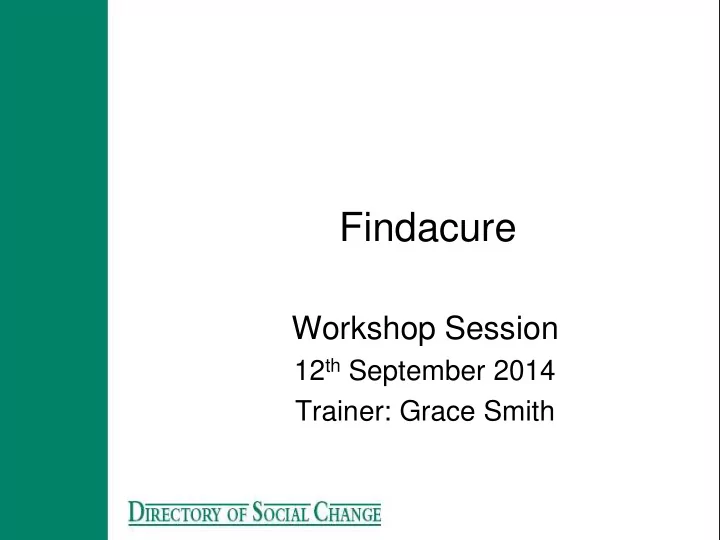

Findacure Workshop Session 12 th September 2014 Trainer: Grace Smith
Objective of the session Participants will • understand the various legal structures available to voluntary groups • understand the requirements of each • understand the responsibilities of committee members
Setting up a group Questions to ask at the outset. What is our purpose? Who will benefit? Where do we want to vest control? How important to us is charitable status? Are we likely to engage in significant commercial activity?
6 legal structures you may have encountered • an unincorporated association • a trust • a company limited by guarantee • charitable incorporated organisation • a community interest company (CIC) • an industrial and provident society
Benefits of charity status • Tax advantages in income • Business rate tax relief • Enhanced standing (e.g. When seeking donations) • Increased access to grant funding
Restrictions for charities • Increased regulation and scrutiny • Limits on trading activity • Restrictions on payments to Trustees and connected persons
Charities In order to qualify as a charity, the organisation must • have charitable objects within the terms defined by the Charities Act 2011 • show evidence of public benefit Charities with an annual income above £5,000 must register with the Charity Commission
Trustees MUST • Comply with audit requirements • Submit an annual return to the Charity Commission updating details comply with additional reporting requirements according to level of income
Responsibilities Trustees • must act prudently, lawfully and according to the governing documents • cannot delegate responsibility • In certain rare circumstances, can be held personally liable • liability is unlimited even if a Company limited by guarantee but is mitigated under the Charities Act 2011
Duties Trustees have a duty • to be informed • to act in the best interests of the organisation • to avoid conflicts of interest
Company Directors • Directors are elected by the members • Where the company is a registered charity, the directors are also trustees • Directors’ liability is limited to company assets so long as they have not acted negligently, criminally or in breach of trust.
Directors MUST • File a copy of the Annual Report and Accounts at Companies House within 9 months from the end of the accounting period • Submit an Annual Return to Companies House NB Late filing carries automatic penalties. Failure to file accounts is a criminal offence
Charitable Incorporated Organisation (CIO) • Must have charitable objects • Has the benefit of limited liability • Is regulated only by the Charity Commission • Is not subject to company law BUT • is more restricted in the terms of the Constitution which must follow Charity Commission models
Community Interest Company (CIC) • Must have a social purpose • Is regulated by the CIC Regulator • Is not a charity • No restriction on payment of Directors • May distribute profits subject to a cap • Assets are locked in.
Recommend
More recommend